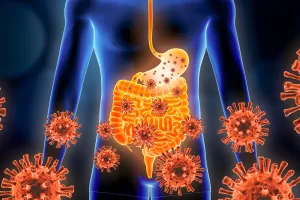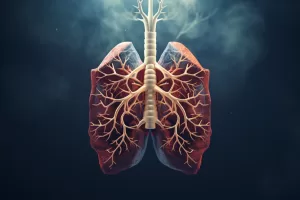A lot of individuals may experience a condition known as infectious diarrhea. This all-around article proposes crucial information about the reasons, prevention, and treatment of infectious diarrhea. Whether you search for lore for personal care or to help others, this guide will provide you with insights to comprehend and deal with this common condition effectively.
What is Infectious Diarrhea
Infectious diarrhea is a gastrointestinal condition caused by parasitic, bacterial, or viral infections. It results in frequent loose or watery bowel movements, usually accompanied by abdominal pain, nausea, and fever. Distinguishing infectious diarrhea from non-infectious diarrhea, which arises as a result of factors such as food intolerances or medication side effects, is of decisive importance for relevant treatment.
Infectious Diarrhea Causes
Infectious diarrhea may be caused by diverse pathogens. Some of them involve viruses, bacteria, and parasites. Contaminated food, water, or contacts with infected people are widespread modes of transmission of infectious diarrhea.
Bacteria
Infectious diarrhea caused by bacteria occurs as a result of consumption of contaminated food or water. Widespread bacterial culprits involve E. coli, Salmonella, Shigella, and Campylobacter. These pathogens invade the gastrointestinal tract, resulting in inflammation and symptoms such as stools, abdominal cramps, and fever. Proper hygiene and food security may assist in averting bacterial infections.
Viruses
Viruses are likewise a frequent cause of infectious diarrhea. Norovirus and rotavirus are highly contagious and are distributed through contaminated food, water, or contact with infected people. These viral infections affect the gastrointestinal lining, leading to symptoms such as vomiting, watery diarrhea, and stomach cramps. Hygiene measures are crucial for prevention.
Parasites
Parasites may also cause infectious diarrhea when ingested through contaminated food or water. Parasitic infections, particularly, Giardia and Cryptosporidium affect the intestines and result in diarrhea, abdominal discomfort, and weight loss. Preventive measures consist of water purification and proper sanitation to decrease the risk of transmission.
Infectious Diarrhea Transmission
Infectious diarrhea transmission happens through the consumption of contaminated food, water, or contact with infected people. Pathogens such as parasites, bacteria, and viruses fall into the body through the mouth and multiply in the gastrointestinal tract, resulting in symptoms such as diarrhea, nausea, and fever. Proper hygiene and sanitary treatment are essential for averting transmission.
Direct contact
Infectious diarrhea may be distributed through direct contact with an infected individual or contaminated surface. Pathogens from their feces may get on hands, objects, or food, and when people touch their mouths, they may become infected. Proper handwashing, compliance with hygiene rules, and disinfection are crucial to decrease direct transmission risks.
Contaminated food or water
Infectious diarrhea transmission usually happens through consuming contaminated food or water. Diverse pathogens such as bacteria, viruses, and parasites may contaminate these sources, resulting in infection when ingested. Improper food handling, unsanitary water sources, and bad food storage may increase the risk. Proper cooking, water cleaning, and hygiene rules are of decisive importance for prevention.
International travel
International travel may contribute to the transmission of infectious diarrhea. Travelers may face unfamiliar food, water, and sanitation conditions, boosting the risk of exposure to diverse pathogens. Consuming contaminated food or water during travel may result in infections, highlighting the importance of caution, proper hygiene, and compliance with secure food rules.
Symptoms of Infectious Diarrhea
Infectious diarrhea manifests itself as frequent, watery bowel movements caused by parasitic, bacterial, or viral infections. General symptoms involve abdominal cramps, vomiting, dehydration, nausea, and fever. Prompt medical aid is crucial to treat symptoms and avert complications. Hydration and proper hygiene are essential for recovery and averting transmission.
Frequent loose, watery stools
Symptoms of infectious diarrhea commonly involve frequent loose, watery stools. This condition is caused by bacterial, parasitic, or viral infections. Patients may likewise experience nausea, fever, abdominal cramps, and dehydration. Immediate medical help, hydration, and compliance with proper hygiene are of decisive importance for managing symptoms and averting further complications.
Abdominal pain and cramping
Infectious diarrhea presents with various symptoms, particularly, abdominal pain and cramping. Caused by parasitic, viral, or bacterial infections, it likewise results in frequent loose, nausea, fever, watery stools, vomiting, and dehydration. Urgent medical aid, hydration, and adherence to hygiene rules are crucial for symptom management and minimizing the risk of complications.
Bloating and gas
Symptoms of infectious diarrhea usually involve bloating and excessive gas. This discomfort emerges because of infection-causing agents irritating the digestive tract. Bloating may cause a feeling of fullness and abdominal distention and increased gas production results in frequent passing of gas. Asking for medical assistance is essential for proper diagnosis and treatment methods.
Fever
Symptoms of infectious diarrhea may likewise involve fever. When the body combats the infection, it enhances its temperature to fight off the invading pathogens. Fever commonly accompanies other gastrointestinal symptoms and may point out a more severe infection. Prompt medical estimation is crucial to identify the reason and treat the condition effectively.
Nausea and vomiting
Symptoms of infectious diarrhea commonly involve nausea and vomiting. The infection irritates the gastrointestinal lining, resulting in a sense of queasiness and the body’s attempt to get rid of harmful agents. Managing hydration and asking for medical help is essential to avert dehydration and complications connected with prolonged symptoms.
Infectious Diarrhea Treatment
Infectious diarrhea treatment usually includes rehydration to avert dehydration, symptomatic relief with the aid of drugs such as loperamide, and eliminating the major reason with the assistance of antibiotics for bacterial infections or antivirals for viral cases. Supporting proper hygiene and sanitation is of decisive importance to avert transmission and relief recovery.
Rehydration therapy
Rehydration therapy is crucial in managing infectious diarrhea. Oral rehydration solutions (ORS) or intravenous fluids assist in replenishing lost fluids and electrolytes, averting dehydration. This easy and effective treatment promotes recovery and is of decisive importance for treating diarrhea caused by infections, particularly, bacterial, viral, or parasitic pathogens.
Antibiotics
Antibiotics perform an essential role in managing infectious diarrhea caused by bacterial pathogens. They assist in eradicating harmful bacteria, decreasing the severity and duration of the illness. Nevertheless, their utilization should be carried out under the direction of healthcare providers to shun needless employment, potential side effects, and the development of antibiotic resistance.
Antidiarrheal medication
Antidiarrheal medications such as loperamide may facilitate symptoms by slowing down bowel movements and decreasing the frequency of diarrhea. While they may assist in managing symptoms, they are not advisable for definite infections and should be utilized with caution under medical supervision to shun potential complications and mask principal problems.
Complications of Untreated Infectious Diarrhea
Untreated infectious diarrhea may result in certain complications. Some of them are as follows: severe dehydration, irritable bowel syndrome, nutrient deficiencies, hemolytic uremic syndrome, and others. It may even progress to various life-threatening conditions like kidney failure or septicemia. Timely medical intervention is essential to avert complications and ensure a full recovery.
Dehydration
If infectious diarrhea is left untreated, it may cause dehydration because of excessive fluid loss. This may result in weakness, dizziness, and decreased urine output. Severe dehydration may demand hospitalization and intravenous fluids to restore the water balance of the body and avert life-threatening consequences.
Hemolytic Uremic Syndrome
Also, untreated infectious diarrhea may progress to hemolytic uremic syndrome (HUS). This is a severe condition that affects the blood, kidneys, and occasionally other organs. Hemolytic uremic syndrome causes red blood cell destruction, kidney failure, and low platelet counts. Timely medical aid is essential to avert HUS and its life-threatening complications.
Irritable Bowel Syndrome
Finally, if infectious diarrhea is left untreated, this may enhance the risk of developing irritable bowel syndrome (IBS). This is a chronic gastrointestinal disorder. It may result in symptoms such as abdominal pain, bloating, and changed bowel habits. Early diagnosis and proper treatment of infectious diarrhea are crucial to decrease the probability of developing irritable bowel syndrome.
How to Prevent Infectious Diarrhea
Preventing infectious diarrhea is simpler than it may seem. As a rule, it is sufficient to practice good hygiene like washing hands frequently, particularly before eating and after utilizing the bathroom. Also, shun contaminated food and water, and follow proper food preparation. Vaccinations and informing about travel advisories may likewise assist in decreasing the risk of contracting infections causing diarrhea.
Hand hygiene
One may avert infectious diarrhea through proper hand hygiene. Wash hands with soap and water for a minimum of 20 seconds before eating, after utilizing the bathroom, and after handling pets. Employ hand sanitizers with a minimum of 60% alcohol when soap and water are inaccessible. These easy steps assist in decreasing the spread of harmful pathogens.
Safe food handling and preparation
It is possible to avert infectious diarrhea by practicing secure food handling and preparation. Cook food thoroughly, shun cross-contamination between raw and cooked foods, and refrigerate perishables rapidly. Wash fruits and vegetables carefully before consuming them to decrease the risk of infections.
Clean water and sanitation
Also, individuals may avert infectious diarrhea by ensuring access to clean water and proper sanitation. Drink from secure water sources or utilize water purification methods. Support sanitary conditions, dispose of waste appropriately, and shun open defecation to decrease the transmission of diarrheal diseases.
Vaccination (where applicable)
Finally, one may avert infectious diarrhea through vaccination (where applicable). Search for vaccinations for diseases such as rotavirus and cholera when accessible and advisable. Vaccines may considerably decrease the risk of contracting these infections and assist in defending individuals and communities from diarrheal illnesses.
Summary
To conclude, comprehension of infectious diarrhea is of decisive importance for prevention and rapid treatment. Compliance with hygiene rules, staying hydrated, and asking for medical aid when required may assist in facilitating symptoms and decreasing the spread of infections. Stay up to date to be secure.
FAQ
What causes infectious diarrhea?
Infectious diarrhea may be caused by diverse infectious agents, particularly, bacteria, viruses, and parasites.
How long does infectious diarrhea last?
The duration of infectious diarrhea may vary depending on the major reason and individual factors. As a rule, the duration may range from several days to a week or more.
Can diarrhea be infectious?
Yes, diarrhea can be infectious. Bacteria, viruses, and parasites may be transmitted through contaminated food, water, or contact with infected individuals.
Is infectious diarrhea contagious?
Yes, infectious diarrhea is contagious which implies that it may be spread between people.






